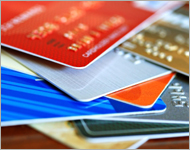
Whether you’re in the beginning stages of starting up your own business or looking to manage your current business’ credit more efficiently, it’s always important to stay on top of your finances. Better Business Bureau is advising business owners to follow a few simple steps to ensure the financial health of their business.
As your business starts to grow, it’s important to build a good credit record for your business that is separate from your personal credit record. Getting credit in your business’ name can help you qualify for lower rates on loans and leases, and can help protect your personal credit record — which could suffer if you have too much business debt.
“It’s never too early to start to establish a separate credit record for your business, even if your business is still in the very early stages,” said Katie Robison, spokeswoman for the BBB serving southeast Nevada. “Keeping your business cards separate helps with record-keeping — many card companies provide special spending reports that can tie in with your business book-keeping software and make it easier to keep track of your business expenses at tax time.”
BBB recommends following these simple steps to manage your business’ credit:
Establish a consistent identity. Always use the same business name, address and phone number from the beginning, so it will be easy for the credit reporting agencies to keep your records in one file. Consider incorporating to legally establish a business identity that is separate from your personal identity.
Open your first accounts. Get a separate checking account for your business. Also open an account with an office supply firm or other supplier that reports the transactions to business credit reporting agencies. Make small charges and pay them immediately — before the invoice even arrives (unlike personal credit scores, you’ll get extra credit for paying before the due date).
Provide key documentation. Lenders will generally ask for your business’ tax records and earnings statements for the past few years so they can see how much you have earned in the past. And they may also ask for a business plan so they can assess your potential for future earnings. They are often interested in looking at your cash flow in relation to expenses and your total debt in relation to your earnings. Provide all of this documentation along with explanations to present the strongest case, especially if you have irregular earnings throughout the year, to prove to lenders that you expect to earn enough money to pay your bills in the future.
Apply for a DUNS number from Dun & Bradstreet, one of the major business credit reporting agencies (go to www.dnb.com). It usually takes 30 days to establish a DUNS number, or you can pay extra for an expedited account. Then make sure that the companies where you have trade accounts are reporting the information about your on-time payments to Dun & Bradstreet. It’s also a good idea to provide extra information about your business for your credit file. This is where potential lenders and others will find out about your business and the likelihood that you’ll make on-time payments for your loans, equipment leases and office leases, which will affect the terms and rates. After you have a DUNS number, open a few more trade accounts with other companies that send information to the credit-reporting agencies, make small charges, and pay those bills early, too. Check your account for errors and to make sure you’re getting credit for your early payments.
Check your business’ credit score. Similar to a credit score for individuals, a PAYDEX score distills the information in your Dun & Bradstreet credit report into one number, which shows potential lenders the likelihood that you’ll make your payments on time. These scores range from a low of 0 to a high of 100. A score of 80 to 100 generally means that you pay your bills before the due date; 50 to 79 means a medium risk of late payment (averages 30 days or less beyond the loan’s terms); and a score of 0 to 49 means a high risk of late payment
For more business tips you can trust, visit www.bbb.org/credit-management/small-business-credit/.
![]()
![]()